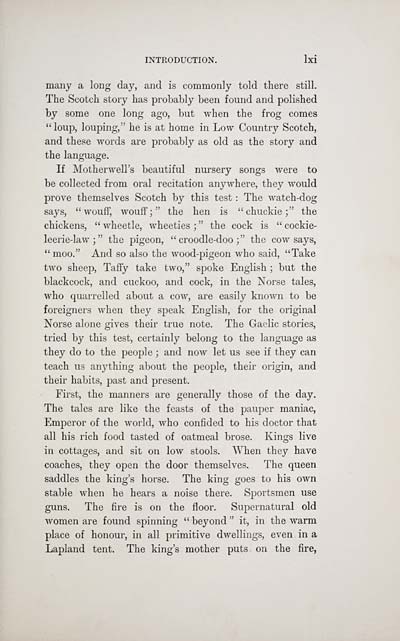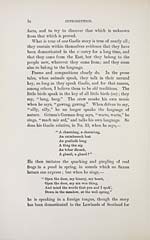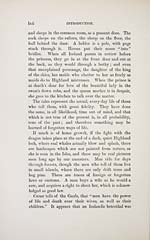Download files
Complete book:
Individual page:
Thumbnail gallery: Grid view | List view

INTRODUCTION. Ixi
many a long day, and is commonly told there still.
The Scotch story has probably been found and polished
by some one long ago, but when the frog comes
" loup, louping," he is at home in Low Country Scotch,
and these words are probablj' as old as the story and
the language.
If Motherwell's beautiful nursery songs were to
be collected from oral recitation anywhere, they would
prove themselves Scotch by this test : The watch-dog
says, "woufF, woufF;" the hen is "chuckle;" the
chickens, " wheetle, wheeties ; " the cock is " cockie-
leerie-law;" the pigeon, " croodle-doo ;" the cow says,
" moo." And so also the wood-pigeon who said, "Take
two sheep, Taffy take two," spoke English ; but the
blackcock, and cuckoo, and cock, in the Norse tales,
who quarrelled about a cow, are easily known to be
foreigners when they speak English, for the original
Norse alone gives their true note. The Gaelic stories,
tried by this test, certainly belong to the language as
they do to the people ; and now let us see if they can
teach us anything about the people, their origin, and
their habits, past and present.
First, the manners are generally those of the day.
The tales are like the feasts of the pauper maniac,
Emperor of the world, who confided to his doctor that
all his rich food tasted of oatmeal brose. Kings live
in cottages, and sit on low stools. When they have
coaches, they open the door themselves. The queen
saddles the king's horse. The king goes to his own
stable when he hears a noise there. Sportsmen use
guns. The fire is on the floor. Supernatural old
Avomen are found spinning " beyond " it, in the warm
place of honour, in all primitive dwellings, even in a
Lapland tent. The king's mother puts on the fire,
many a long day, and is commonly told there still.
The Scotch story has probably been found and polished
by some one long ago, but when the frog comes
" loup, louping," he is at home in Low Country Scotch,
and these words are probablj' as old as the story and
the language.
If Motherwell's beautiful nursery songs were to
be collected from oral recitation anywhere, they would
prove themselves Scotch by this test : The watch-dog
says, "woufF, woufF;" the hen is "chuckle;" the
chickens, " wheetle, wheeties ; " the cock is " cockie-
leerie-law;" the pigeon, " croodle-doo ;" the cow says,
" moo." And so also the wood-pigeon who said, "Take
two sheep, Taffy take two," spoke English ; but the
blackcock, and cuckoo, and cock, in the Norse tales,
who quarrelled about a cow, are easily known to be
foreigners when they speak English, for the original
Norse alone gives their true note. The Gaelic stories,
tried by this test, certainly belong to the language as
they do to the people ; and now let us see if they can
teach us anything about the people, their origin, and
their habits, past and present.
First, the manners are generally those of the day.
The tales are like the feasts of the pauper maniac,
Emperor of the world, who confided to his doctor that
all his rich food tasted of oatmeal brose. Kings live
in cottages, and sit on low stools. When they have
coaches, they open the door themselves. The queen
saddles the king's horse. The king goes to his own
stable when he hears a noise there. Sportsmen use
guns. The fire is on the floor. Supernatural old
Avomen are found spinning " beyond " it, in the warm
place of honour, in all primitive dwellings, even in a
Lapland tent. The king's mother puts on the fire,
Set display mode to: Large image | Transcription
Images and transcriptions on this page, including medium image downloads, may be used under the Creative Commons Attribution 4.0 International Licence unless otherwise stated. ![]()
| Early Gaelic Book Collections > Matheson Collection > Popular tales of the west Highlands > Volume 1 > (81) |
|---|
| Permanent URL | https://digital.nls.uk/81388200 |
|---|
| Description | Volume I. |
|---|---|
| Shelfmark | Mat.74 |
| Additional NLS resources: | |
| Attribution and copyright: |
|
| Description | Items from a collection of 170 volumes relating to Gaelic matters. Mainly philological works in the Celtic and some non-Celtic languages. Some books extensively annotated by Angus Matheson, the first Professor of Celtic at Glasgow University. |
|---|
| Description | Selected items from five 'Special and Named Printed Collections'. Includes books in Gaelic and other Celtic languages, works about the Gaels, their languages, literature, culture and history. |
|---|

